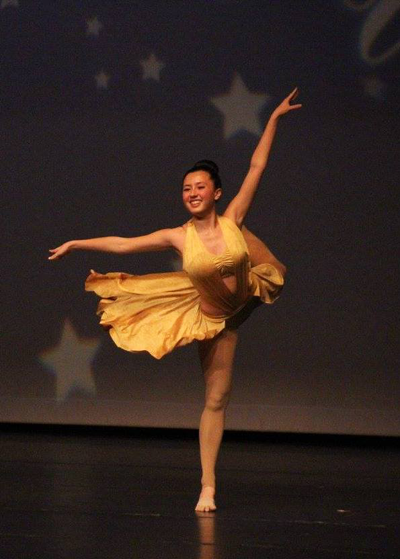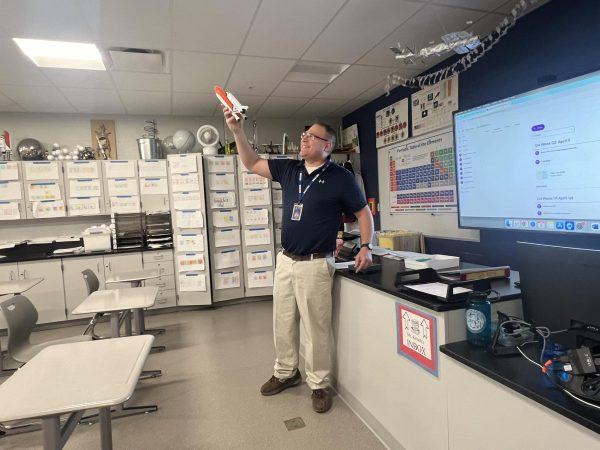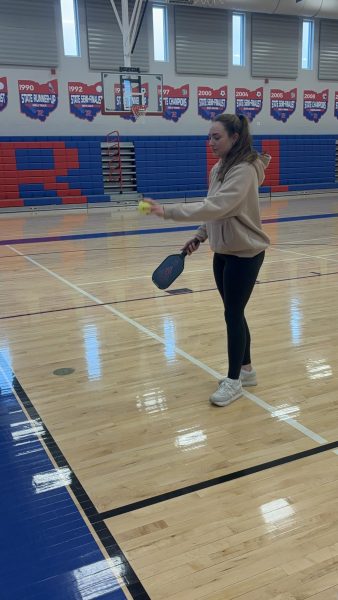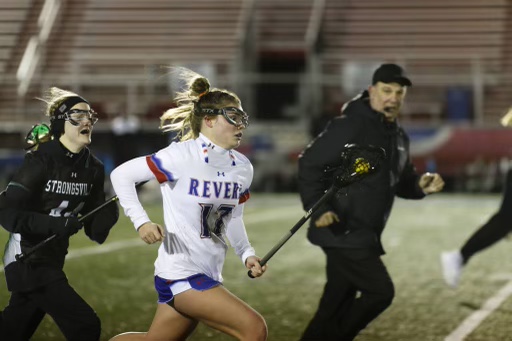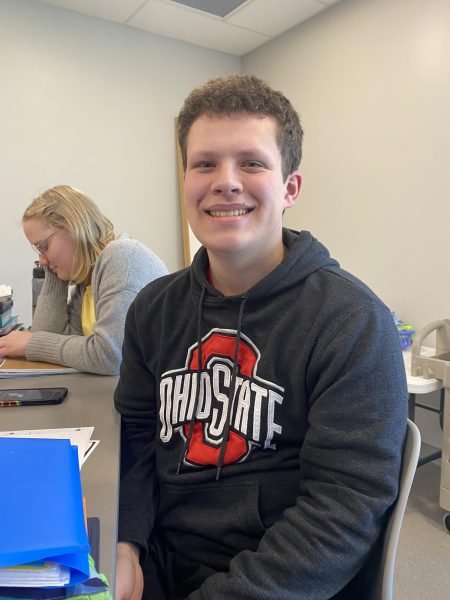Revere junior pursues various dance styles
It smells like Chipotle and socks in here; it looks like a glitter bomb burst on the walls in here; it sounds like an enormous piano’s chords ringing loudly in here. Dancers’ reflections emulate their strides and leaps on mirrors throughout the various rooms. Girls sit on the floor surrounded by their duffel bags and water bottles.
Inside the neon-and-glitter painted walls of the Art in Motion (AIM) dance studio in Wadsworth, Revere High School junior Jessica Weil spends nearly twenty hours each week perfecting her dance technique, learning and rehearsing choreography for countless pieces which she will perform in the coming months. She also practices for upcoming performances with the studio’s non-profit counterpart Tour de Force Entertainment Company.
Weil began dancing at age three, a standard age at which most dancers start the sport, at Jill Royka Dance Studio in Medina. At age four she came to AIM. Initially, Weil only took ballet and tap classes, which her mother, Rosy Hong, hoped would correct the young Weil’s pigeon-toed feet. Dancing, however, proved more important to Weil than a foot-fixing stint. Weil now participates in ballet, pointe, tap, jazz, and lyrical classes, all in which she stands out as a leader according to her dance instructor and owner of AIM, Jessica Franklin.
“[Weil is] a really, really hard worker, and I know that she works hard outside of the studio . . . She’s got a stellar memory . . . I admire that kind of control that she has over her work ethic,” Franklin said.
Franklin, walking into the studio with her children on Wednesday night, brings Weil a small dinner from the Sheetz gas station down the street. Weil appreciates this family-like bond and sense of togetherness at AIM. She feels that dance requires teamwork, which brings her and her teammates close together.
“Dance seems like an individual sport, but when [you are] in a group, you have to choreograph together; do the same steps, get the timing right and be synchronized. The formations are really specific, and the details are really specific. It has helped me learn that you have to collaborate with people if you want to get a big ending product,” Weil said.
Franklin shares this feeling, as she has known Jessica since her first days at the studio.
“Part of what I like about my job is that [I] have a relationship with the girls… for such a long time. [Weil] was a little bit of a pistol as a younger kid… But now, she is one of our leaders. She is a quiet leader,” Franklin said.
Sitting on the floor between tap and ballet class, Weil tries to finish her homework with her friend Holland, a student at Medina High School, but they repeatedly interrupt each other with stories and laughs. Weil declares, with a sigh, that she needs to re-sew her pointe shoes, which appear torn to shreds from repeated use. As ballet class approaches, Weil neglects her torn shoes and rushes to tie her hair in a sleek bun, assisted by her other instructor, Emily Franklin.
Before ballet class at 7:30 pm, Weil had tap class at 4:30 pm. She learns around ten or eleven dances for competitions, where she competes in ballet, pointe, tap, jazz and lyrical dance. She began competing at age five, the youngest age at which one can compete at her studio. Last year, Weil won high awards at various competitions as a member of a four-person tap group called Tap Cult. Weil explained how competitions run.
“[Directors of the competition] give you a schedule, [and they] split [dances] up by categories and age. Solos of a certain age will go at a certain time, and then duets and trios will go, and then groups and larger groups. You [do not] get to pick when you [dance]. You just have to follow the schedule. And there’s an awards session after every category where they’ll give you a ranking of high silver to platinum. [The rankings are] high silver, gold, high gold, platinum, and sometimes you can get higher than platinum, like a diamond; it depends on the competition. So then they [will] do [overall awards] at the end of that award session. And then at the end of the entire competition they’ll have a major awards where they do overall for the entire competition,” Weil said.
Competitions usually last from Friday to Sunday, but they may begin on Thursday if many studios attend the competition. Weil’s mother, Rosy Hong, loves watching her daughter dance at performances and competitions.
“As corny and sappy as it sounds, I am sometimes moved to tears when I watch [Weil] dance. She really is such a beautiful and expressive dancer, and I absolutely love to watch her dance. The sense of pride I get when I watch her dance is immeasurable,” Hong said.
Once in ballet class, Weil stands in a corner at the barre, a handrail at hip height for maintaining balance, against the wall. The teacher of the class, Emily, performs a quick set of steps, and the eleven students in the class repeat this exercise. Emily starts the music, which sounds like ragtime-style piano remixes of recent popular songs. Weil jumps straight into the air, her legs propelling the rest of her body upwards.
“Ballet makes me feel professional. It makes me feel beautiful,” Weil said.
Weil uses her ballet technique skills when she performs with Tour de Force entertainment company. Weil explains that Tour de Force provides a different environment for dancing because she has to learn dances quicker and perform in non-traditional settings.
“We perform at nursing homes… and we perform at amusement parks or malls or at any community place. We’ve performed at the IX Center before. We do a lot of holiday-oriented shows like Christmas shows or Halloween shows,” Weil said.
The dancers clear the floor of the room and stand in the center, preparing themselves for jumping exercises. As they begin jumping, they breathe heavily and get stomach cramps, but Weil does not complain as some of the others do. Weil wishes to pursue dance as a minor in college, and one day perform or teach. Hong would love to watch her daughter continue dancing after high school.
“I would love to see Jessica continue to dance after she graduates from high school. It [has] been such a major part of her life that I [cannot] imagine her not dancing. I would be happy if she did anything in the performing arts,” Hong said.
Weil’s studio will perform before the Cleveland Cavaliers’ basketball game on March 29, and Weil will be selling tickets to friends, students, and families for 36 dollars each.
By the end of ballet class, the dancers leap across the room, twirling and beaming, watching their reflections in the mirror on the wall. The music blares over the speakers, and the dancers open a window in the corner of the room to feel the cool breeze on their sweaty skin. Class concludes after repetitions of jumps, and the girls applaud and race out of the room to their duffel bags and water bottles.

